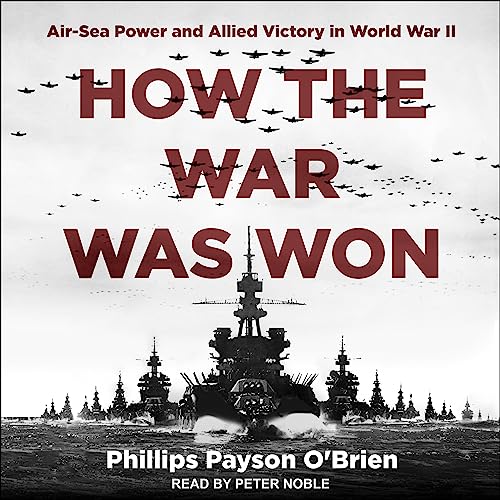
How the War Was Won
Air-Sea Power and Allied Victory in World War II
Failed to add items
Add to Cart failed.
Add to Wish List failed.
Remove from wishlist failed.
Adding to library failed
Follow podcast failed
Unfollow podcast failed
3 months free
Buy for $24.49
No default payment method selected.
We are sorry. We are not allowed to sell this product with the selected payment method
-
Narrated by:
-
Peter Noble
World War II is usually seen as a titanic land battle, decided by mass armies, most importantly those on the Eastern Front. Phillips Payson O'Brien shows us the war in a completely different light. In this compelling new history of the Allied path to victory, he argues that in terms of production, technology, and economic power, the war was far more a contest of air and sea than of land supremacy. He shows how the Allies developed a predominance of air and sea power which put unbearable pressure on Germany and Japan's entire war-fighting machine from Europe and the Mediterranean to the Pacific. Air and sea power dramatically expanded the area of battle and allowed the Allies to destroy over half of the Axis's equipment before it had even reached the traditional 'battlefield'. Battles such as El Alamein, Stalingrad, and Kursk did not win World War II; air and sea power did.
©2015 Phillips Payson O’Brien (P)2023 TantorListeners also enjoyed...




















People who viewed this also viewed...


















The Air and Sea side of things
Something went wrong. Please try again in a few minutes.
If you don’t like details stay home
The details are insane literally
Something went wrong. Please try again in a few minutes.
Eye opening
Something went wrong. Please try again in a few minutes.
Gave a new understanding of World War II
Something went wrong. Please try again in a few minutes.
A look at the numbers
Something went wrong. Please try again in a few minutes.
Very interesting arguments
Something went wrong. Please try again in a few minutes.
Excellent history, but repetitive
Something went wrong. Please try again in a few minutes.
excellent
Something went wrong. Please try again in a few minutes.
The amount of statistical detail and different pint if view
Something went wrong. Please try again in a few minutes.
Where's the story?
Something went wrong. Please try again in a few minutes.



